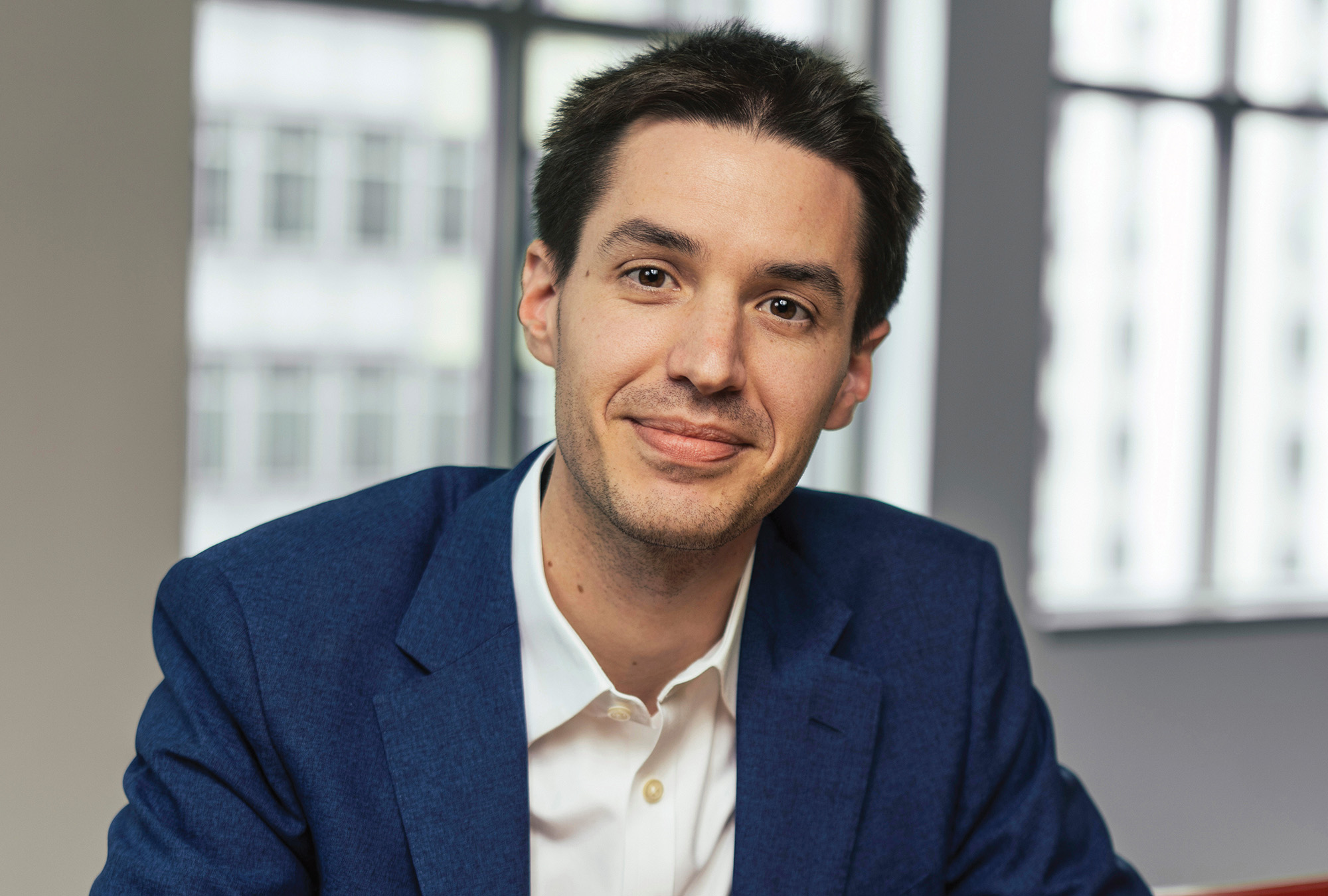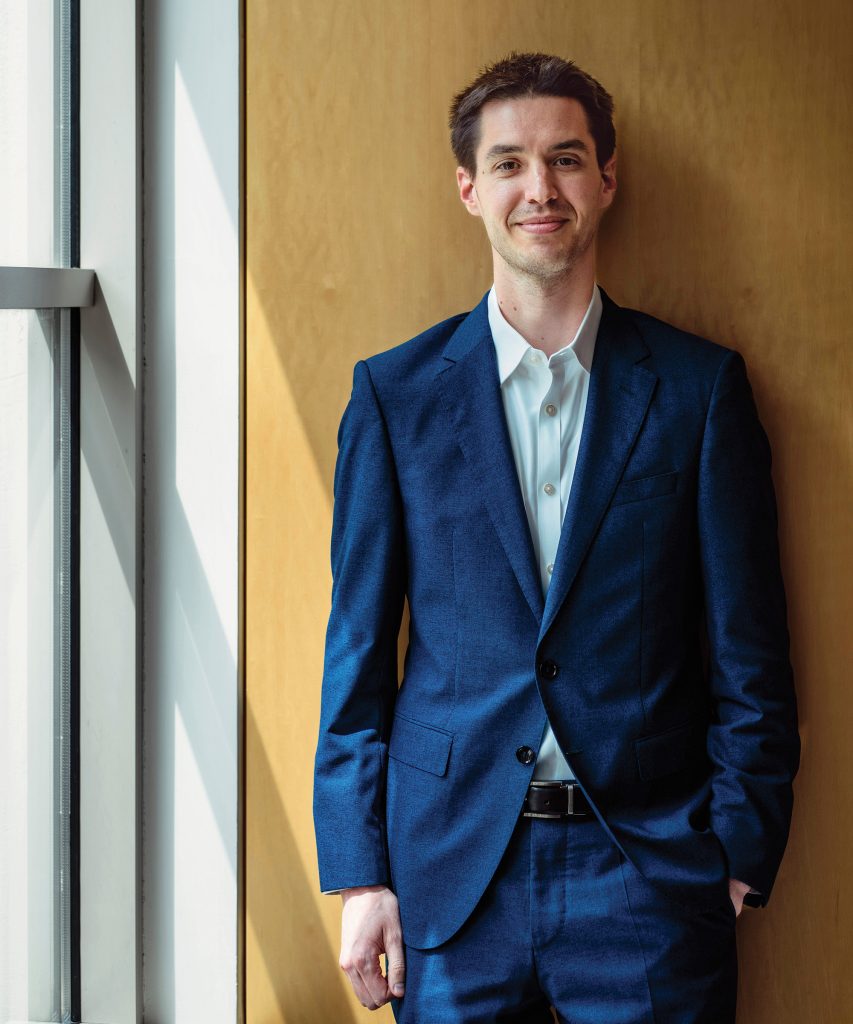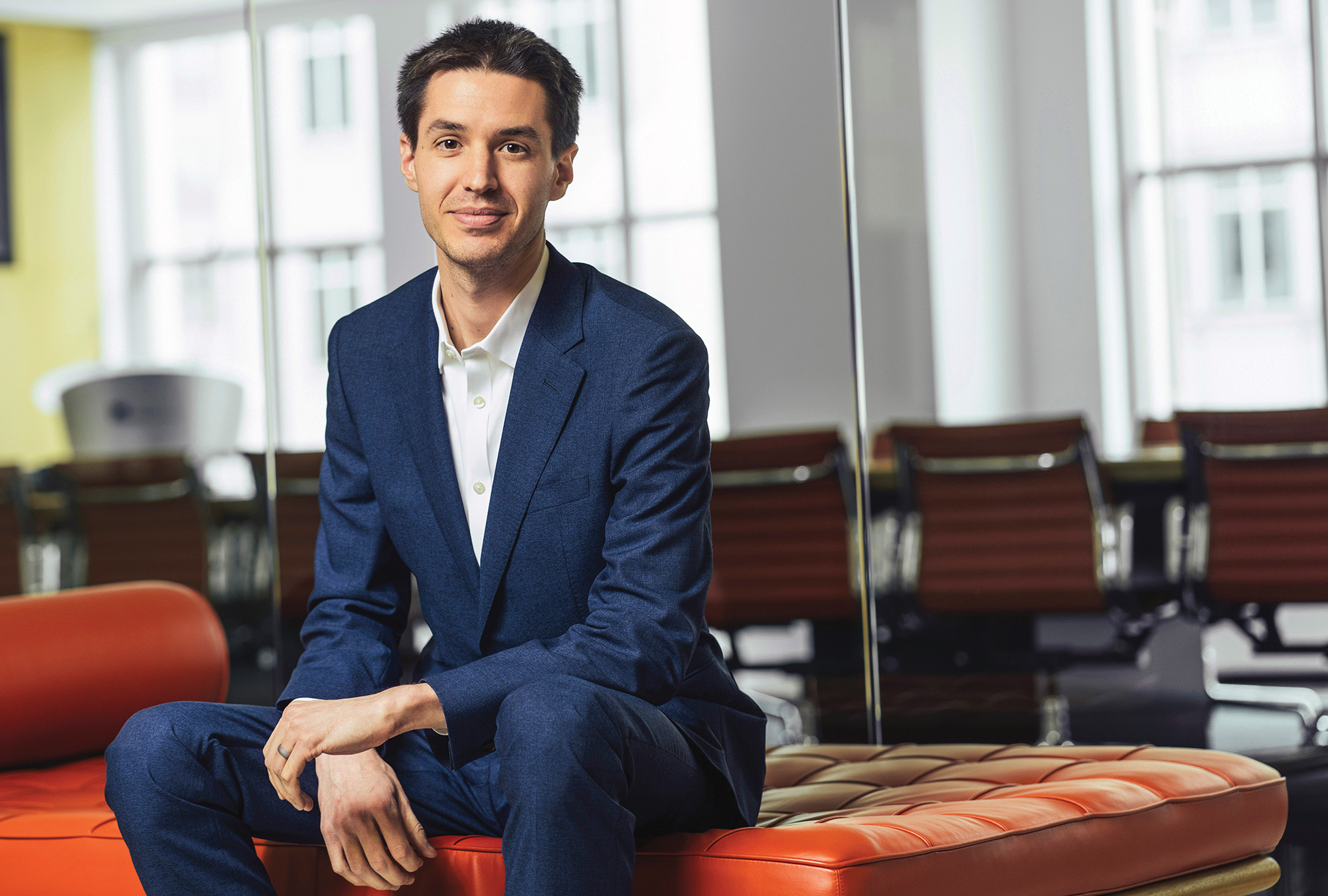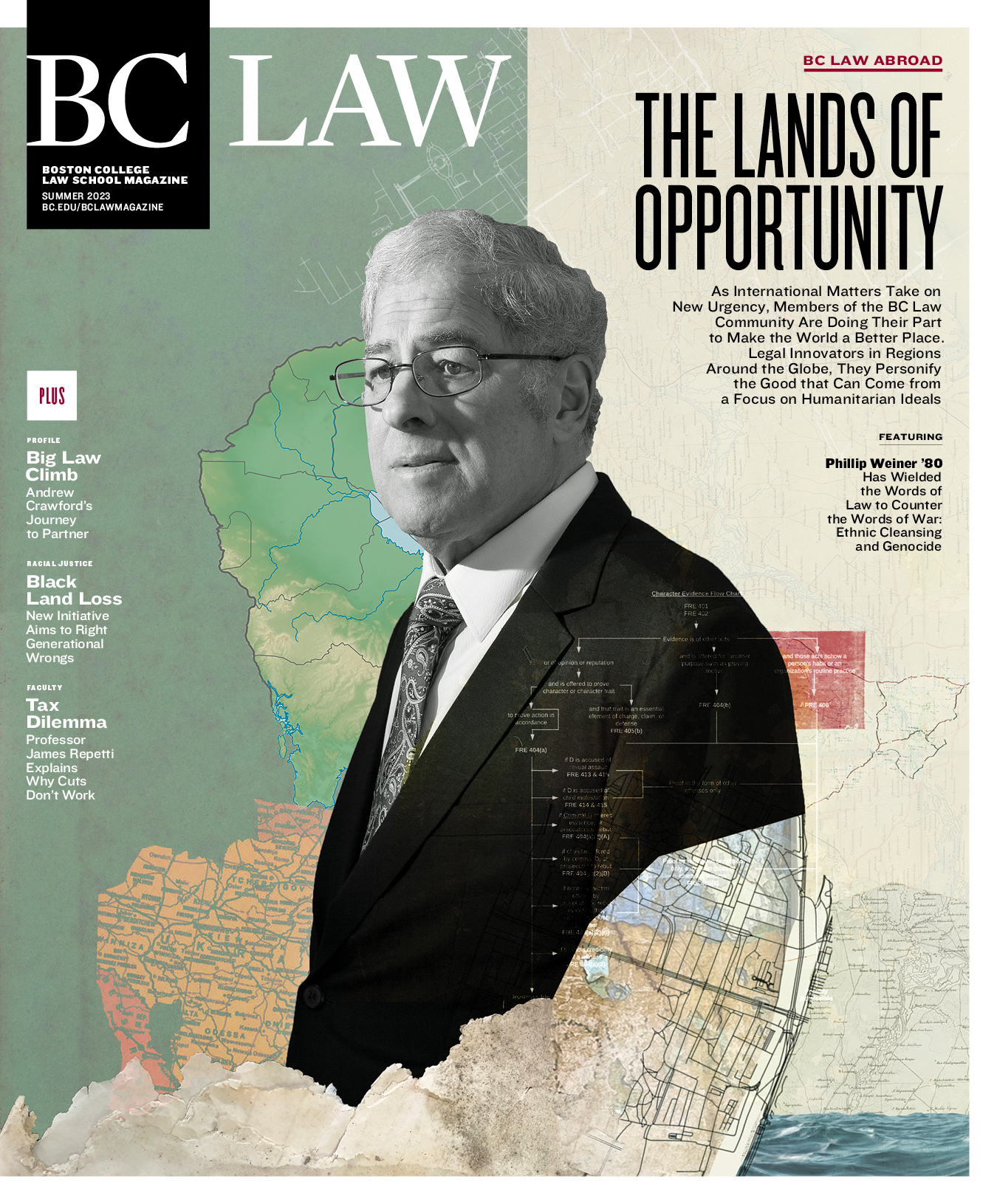February 1, 2023, Andrew Crawford ’15 reached a coveted milestone: After seven years as an associate at his law firm Brown Rudnick, in the very first year he was eligible, he was named a partner.
“You start as a summer associate, and it’s just kind of this pipe dream, right? It seems so far off,” Crawford reflects. “And then you’re a mid-level associate, and you look at your colleagues and you say, they just know so much more than I do, will I ever get there? And then to make partner. It’s an incredible honor.”
Large law firms have a reputation for demanding a lot of their associates, requiring meticulous work product in high-stakes cases and long, long hours. But they offer a lot, too: early career exposure to interesting, sophisticated legal work, and robust opportunities for training and mentorship. Crawford’s is the story of how a young man’s choices delivered him to a legal career rich in challenge, achievement, meaning—and joy. For an aspiring lawyer with a certain temperament and ambition, the quest for partnership in Big Law is an adventure. And from all accounts, Crawford is a natural.
Early on, Crawford recognized in himself certain proclivities that made law an attractive eventual career choice. “Growing up, I always enjoyed reading and writing more than math and science, and I played a lot of sports growing up, and I was always competitive,” he says. “The law, particularly litigation, felt like a profession that can kind of cater to that competitive spirit.” Business school was also an option, but as an undergraduate at Wake Forest University, he decided to major in history, which he felt put him on the path to law school. After he graduated college in 2011, he spent a year working for Pfizer in the government relations office, and enrolled at BC Law in 2012.
The summer of 2013, between his 1L and 2L years, Crawford clerked for David Lowy, who was then an Essex County (Massachusetts) Superior Court judge and is now a justice on the Massachusetts Supreme Judicial Court.
The fall of 2013—the start of Crawford’s second year—brought the annual ritual of major law firms from across the country arriving on campus to interview some of the Law School’s most promising 2Ls for summer associate jobs. Law firms use this process to build their workforce pipeline: Summer associates are hired during the on-campus interview process, and if their summers are successful, they are invited back to join the firms upon graduation as junior associates.
During this process, Crawford’s talents landed him interviews with several firms. Among them was Brown Rudnick, a firm that was listed as having 202 lawyers in 2022 and in 2021 earning gross revenues of $228,718,000. Brown Rudnick has offices in Boston; Hartford, Connecticut; London; New York; Providence, Rhode Island; Washington, DC; and Dublin.
Crawford doesn’t recall spending much time preparing for his Brown Rudnick interview. “I wanted to be authentic, and I didn’t want to give planned answers. And the reality of the situation was I didn’t really know that much about what being a lawyer was, or working in a law firm,” he says. “I just remember talking about college and life, and it was just a very smooth, organic conversation.” It obviously went well; he eventually got called back for a second round of interviews, this time at the firm’s DC office.

“Growing up, I always enjoyed reading and writing more than math and science and I played a lot of sports… and I was always competitive. The law, particularly litigation, felt like a profession that can kind of cater to that competitive spirit.”
Meanwhile, other firms were courting him. He was on a train from Boston to New York for a second interview with another firm, listening to the song “Sunny and 75” by Joe Nichols, when Brown Rudnick called and offered him a position as a summer associate in Washington. He decided not to wait for any other offers. “I really enjoyed the people I had spoken with at Brown Rudnick. It was a firm with a solid reputation, market salary, and option to return home to DC. Checked all the boxes,” he says.
Crawford was one of some fifteen or so first-year law students working for Brown Rudnick that summer. “It felt like a ten-week job interview,” he says. “It felt like you always had to be on.” Even social events like bowling or baseball games felt like part of the test.
He was assigned to work in government contracts assisting in a bid protest. A bid protest happens when the government awards a contract to Company A, and Company B formally disputes the award, arguing that B, not A, should have gotten the contract. “I didn’t know a thing about government contracts until my very first assignment as a summer associate,” Crawford says.
What he was to discover is that the pace of bid protest practice is intense. Lawyers need to review voluminous documentation, master a lot of technical information, and come up with new legal arguments, all within a handful of weeks. The Government Accountability Office, the adjudicating body, decides cases within 100 days. Contracts range from the tens of millions to tens of billions of dollars. “Of all my assignments, that was the one I enjoyed the most,” Crawford says.
When his summer stint concluded at the end of July, the looming question was, would he be one of the summer associates to get an offer to join the firm as a junior associate? Crawford was on a ten-day trip with friends to Alaska and Vancouver when he learned that the firm was starting to make its decisions. He found out while on an excursion touring glaciers in a boat with spotty cell reception. A text from one of his summer colleagues managed to make it through with the unfortunate news that the colleague had not received an offer. “I was like, oh, crap, that means they are making calls right now, and it means that not everyone is getting offers,” Crawford recalls.
Four hours later, the glacier tour was over and Crawford and his friends were stopped in Whittier, Alaska, about to go through a tunnel where they’d lose cell reception for a good ten minutes. That’s when the call came and he and Brown Rudnick finally connected. “It was kind of a wild day,” laughs Crawford, who was then twenty-five. “Whittier, Alaska, will always have a very special place in my heart.” The law firm offered him his first choice: to practice in government contracts in Washington, DC. “I think that was an important moment in my career,” Crawford says.
The point of government procurement law is to ensure that the taxpayer’s money is being spent without corruption, and at good value. “The bid protest mechanism is one of the ways that we make sure that the system is working as intended,” says Professor Daniel Lyons, who is also BC Law’s associate dean of academic affairs and has represented clients in bid protests. “It’s a very important area of the law that not a lot of litigators go into. I’m proud that we have a successful alum who’s doing so well in that area.”

“I think that, as a junior attorney, probably your biggest asset can really be your availability. I never turned down work, no matter how busy I felt. I just wanted to learn, to prove to the folks I was working with that I was a hard worker and capable. I said yes to everything and did as much as was handed to me.”
Crawford consciously positioned himself as someone who was available and eager to help. “I think that, as a junior attorney, probably your biggest asset can really be your availability,” he says. “I never turned down work, no matter how busy I felt. I just wanted to learn, to prove to the folks I was working with that I was a hard worker and capable. I said yes to everything and did as much as was handed to me.” In addition to bid protests, Crawford was tapped to work on many commercial and civil litigation matters.
Kenneth Weckstein, a Brown Rudnick partner with a government contracts and litigation practice, describes Crawford as “a good athlete,” meaning that Crawford has the skills, facility, and drive to excel as a lawyer. The matters Crawford took on, Weckstein says, required working at all hours, including weekends, in many different subjects, and he managed the pressure well, interacting beautifully with clients, peers, and supervisors, always well-balanced, thoughtful, considerate, caring, and helpful. Importantly, Crawford was not afraid to ask questions. “He’s not deterred by the fact that the person he’s asking the question to might get impatient with him. He’s not afraid to challenge things if he needs more information or he thinks that they may be wrong,” Weckstein says.
Burnout rates in Big Law can be high. Crawford, however, thrived.
“There’s not a lot that gets to me,” he says. Although he’s a litigator, which is adversarial in nature, Crawford says he isn’t confrontational and doesn’t take things personally. “I don’t know that I appreciated that aspect of my personality until I got to Brown Rudnick and the full-time practice of law. I learned that I am capable of handling the challenges and stresses associated with this type of work, and a lot of people aren’t. I guess I’ve learned that I’m not only capable of handling it, but I rather enjoy it.”
Crawford was an associate with less than three years of experience when Benjamin Chew joined Brown Rudnick as a partner. Chew is a seasoned trial attorney who counted celebrities as among his clients. “I was in a lull period,” Crawford recalls. “I just kind of marched into Ben’s office and said, ‘Hey Ben, I’m Andrew, welcome to the firm. Let me know if you need anything.’” Chew was representing Johnny Depp in the actor’s defamation case against his former wife Amber Heard, and he tapped Crawford for the team. “I look for people who are honest, likable, earnest, and who I think a judge or a jury and a client would relate to, and Andrew really fits the bill,” Chew says.
The night before opening statements in the Depp trial, a lawyer’s nightmare came true: The team lost their written argument and couldn’t recover it from the computer. “Andrew stayed up all night and effectively rewrote it,” Chew says. “I was the oldest one on the team, I needed sleep, so I went home and Andrew showed up at my door at quarter of six in the morning with a wonderful draft opening. I give him credit for having the perseverance and the poise to think clearly when many of us were incapable of doing it.”
Impressing the higher-ups in the flagship Boston and New York offices was necessary for Crawford’s ascent to partner; that’s where the decision was going to be made. Being in Washington, DC, meant that it would be that much harder to get on their radar. Chew became one of Crawford’s strongest advocates on his path to partnership, and so, according to Chew, did Wayne Dennison, who heads the commercial litigation group and is based in Boston. “The fact that he made such a strong impression on a partner in another office—the dynamics make that harder,” Chew says.
Having mentors and advocates like Weckstein, Chew, and Dennison was key. The win in the Depp case couldn’t have hurt, either. In another notable win, Crawford was on the team that prevailed in a $28 billion bid protest involving a contract awarded by the National Nuclear Security Administration, a federal agency that rarely loses bid protests.
The day Crawford got the news that he had made partner, he went out for celebratory champagne with a couple of his young colleagues from the Depp trial. “It was a really great afternoon,” he says. “Next day was back to business as usual!”
It’s actually atypical to become partner at the law firm that you started in straight out of law school, according to Douglas Saphire, then-interim dean for Career Services at BC Law. “Even for the relatively smaller number of folks who start on that path and become partners, an even smaller number of them in my experience are folks who stay at the same place before becoming partner,” Saphire says. “He obviously found at the very beginning of his career a place that was the right fit for him.”
Along the path to partnership, Crawford has learned a lot about himself. “I think you have to be motivated by something more than just money,” Crawford says. “They pay you well in a big law firm, but if that’s all you’re doing it for, I don’t think you’re going to survive. I don’t think you’re going to be happy. You’ve got to enjoy the work; you’ve got to enjoy the challenges. It’s hard to tell if you’re that type of person without going through it.”And there’s still so much more to learn. “This is not the end of the journey,” Crawford says. “It’s the start of a new journey.”



